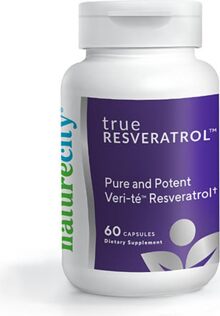
NatureCity TrueResveratrol
Go to Store
NatureCity TrueResveratrol
Go to StoreSetting a New Standard for Resveratrol Supplements!
Resveratrol – or trans-resveratrol – is a phytoalexin and found in small quantities in foods such as grape skins, peanuts and some berries. Phytoalexins are natural polyphenol compounds produced by plants as a self-defense mechanism. In the 1990s, resveratrol started receiving great public attention as a possible explanation for the “French Paradox," which explores why the French have lower rates of heart disease despite a diet rich in saturated fat, significant amounts of alcohol and cigarette smoking. As one of the main polyphenols in red wine – which the French commonly drink in moderate amounts – it was speculated that resveratrol was responsible for better heart health among the French.
Some scientists have challenged this notion, because an eight-ounce glass of wine contains just 1 to 2mg of resveratrol – you’d have to drink more than six bottles daily to get a beneficial amount of resveratrol! Nevertheless, this set off a flurry of research into resveratrol over the last 20 years. Only in the last decade have we seen significant evidence that resveratrol can help support healthy aging in humans. Of the more than 170 clinical trials conducted with resveratrol, the vast majority have been published since 2014. The scientific evidence suggests resveratrol can support healthy aging by helping to reduce oxidative stress, promote better blood flow to the brain and circulation throughout the body, and by helping your body maintain healthy levels of inflammation.



